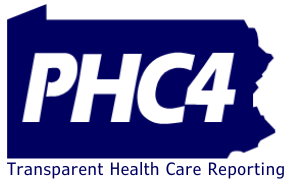Contact: Joe Martin 717-232-6787
NEW PHC4 REPORT ON CARDIAC SURGERY SHOWS LOWER MORTALITY AND READMISSION RATES
Harrisburg, PA – January 31, 2017 – Statewide mortality and readmission rates for patients undergoing cardiac surgery continue to decline according to a performance report of Pennsylvania hospitals and cardiac surgeons released today by the Pennsylvania Health Care Cost Containment Council (PHC4).
Since 1994, the statewide in-hospital mortality rate decreased 53.4% for CABG (without valve) surgery and since 2005 the in-hospital mortality rate decreased 46.7% for valve surgery patients, translating to 267 lives saved. In fiscal year 2002/2003, 12.8% of patients were readmitted to the hospital within 30 days following CABG (without valve) surgery. That percentage dropped to 10.6% in fiscal year 2014/2015, 17.2% decrease. For valve surgery patients, the readmission rate dropped 25.4%, from 17.8% to 13.3% between fiscal years 2005/2006 and 2014/2015. These decreases translate to 373 fewer readmissions and approximately $4.2 million saved.
“These results are examples of how transparency, through public reporting, helps to improve quality and decrease/manage costs,” said Joe Martin, PHC4’s Executive Director. “Lower mortality and readmission rates also underscore the dedication of Pennsylvania hospitals and heart surgeons to healthy outcomes for their patients,” added Martin.
The Cardiac Surgery in Pennsylvania report, which is free and available from PHC4’s website at www.phc4.org, includes hospital-specific and surgeon-specific mortality and readmission ratings as well as volume of cases. Average charges and average Medicare fee-for-service payments are reported for hospitals. Statewide trends are also examined.
“We encourage Pennsylvanians to use the report to make better informed health care decisions. For example, consumers can check the report as they research cardiac surgeons and hospitals, medical providers can review care indicators to determine steps for improvement, and administrators can use the data to determine steps they can take to improve outcomes and manage costs,” Martin said.
The report covers 29,578 patients who were discharged from a Pennsylvania general acute care hospital after undergoing coronary artery bypass graft (CABG) surgery and/or heart valve surgery between January 1, 2014 and March 31, 2016.
Key findings of the report are:
- As mentioned above, statewide, the in-hospital mortality rate decreased 53.4% for CABG (without valve) surgery, from 3.2% in 1994 to 1.5% in 2015. For valve surgery patients, the in-hospital mortality rate decreased 46.7%, from 5.2% in 2005 when PHC4 began reporting on valve surgery to 2.7% in 2015. These decreases translate to 267 lives saved.
- In fiscal year 2002/2003, 12.8% of patients were readmitted to the hospital within 30 days following CABG (without valve) surgery. That percentage dropped to 10.6% in fiscal year 2014/2015, 17.2% decrease. For valve surgery patients, the readmission rate dropped 25.4%, from 17.8% to 13.3% between fiscal years 2005/2006 and 2014/2015. These decreases translate to 373 fewer readmissions and an approximate savings of $4.2 million.
- Decreased readmission rates are important because readmissions add to the overall cost of care through additional days spent in the hospital and increased payments. Overall, 2,270 patients who underwent CABG and/or valve surgery between January 1, 2014 and August 31, 2015 were readmitted to the hospital within 30 days, adding 12,857 hospital days and an estimated $25.4 million in additional payments.
Other Findings:
- The total number of CABG (without valve) procedures declined 57.9%, between 1994 and 2015, from 18,899 to 7,962. The total number of valve procedures (with or without CABG) increased 11.3%, from 6,643 in 2005 when PHC4 began reporting on valve procedures to 7,396 in 2015.
- The average number of CABG and/or valve surgeries performed annually by hospitals continues to decline, from 321 in 2005 to 256 in 2015.
- The average number of CABG and/or valve procedures performed annually by surgeons decreased from 115 in 2005 to 95 in 2015.
PHC4 is an independent state agency charged with collecting, analyzing and reporting information that can be used to improve the quality and restrain the cost of health care in the state. More than 840,000 public reports on patient treatment results are downloaded from the PHC4 website each year and nearly 100 organizations and individuals annually utilize PHC4âs special requests process to access and use data. Created by the Pennsylvania General Assembly in 1986, PHC4 is governed by a 25-member board of directors, representing business, labor, consumers, health care providers, insurers and state government.

